#implicit differentiation
Explore tagged Tumblr posts
Text
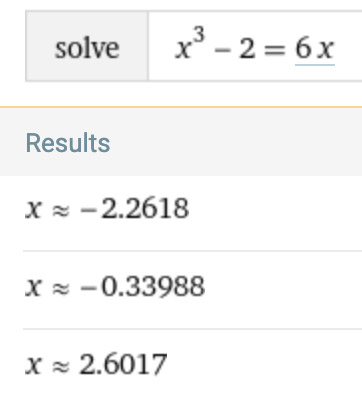
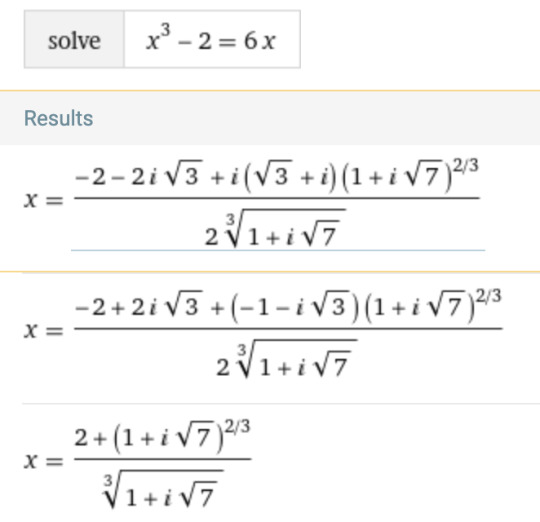
&*#$)*@! Cubic Formula
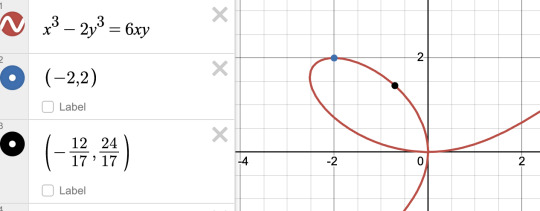
11 notes
·
View notes
Text
Implicit Differentiation - Ex. 3


Patreon
#studyblr#notes#math#maths#mathblr#math notes#maths notes#calculus#calculus notes#calc#calc notes#calc ex#calc example#calculus example#calculus ex#calc 1#calculus 1#calc I#calculus I#differentiation#calculus differentiation#differentiation in calculus#worked math problems#math problems#calculus problems#implicit differentiation
13 notes
·
View notes
Text
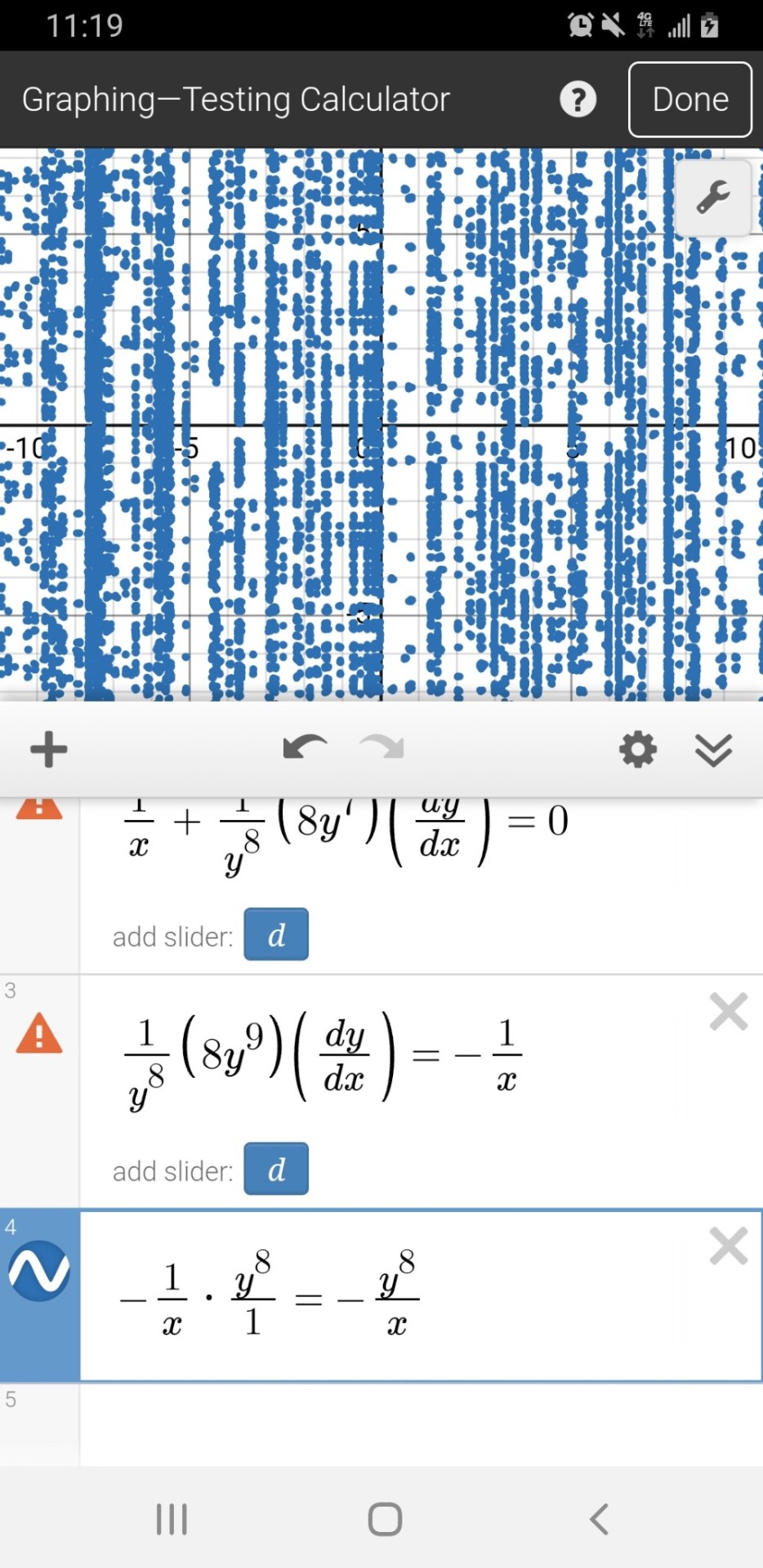

If anyone needs further proof that calculus is cursed, I was doing some implicit differentiation and I swear to god it looks like some one dumped Zalgo Text all over my screen.
28 notes
·
View notes
Text
thinking about heartless pikmin au instead of doing my maths homework that is already overdue and i need to hand in by tomorrow 😔😔😔
2 notes
·
View notes
Text
when the professor makes you find the second derivative of an equation using implicit differentiation and writing the equation out once requires 2.5 lines of notebook paper and you have to color code based on what side of the = terms are on bc otherwise it's just a jumble 🤪🤪
0 notes
Text
one of the worst feelings in the world is feeling like you understand a concept but then getting all the problems wrong.
#i SWEAR i feel like i understand implicit differentiation. however all the proof points to that Not being the case .#im going to go on in my studying and come back to it#because it is making me. very frustrated. and i know ill not get anywhere if i dont calm down first . :(#cae speaks
1 note
·
View note
Text
This is a bigger problem in the fanfic realm as well, because I have recently frequently been running into the problem of being drawn in by shippy fanfics that involve things like captivity, enslavement, and other scenarios that inherently constitute reduced autonomy and thus dubious (at best) consent, but actively refuse to engage with those implications.
And it's frustrating, because these are scenarios that I find compelling, and that have the potential for very rich emotional work. I like the juxtaposition of physical pleasure or emotional fulfillment with feelings of fear and violation, and the shame and self-blame that those feelings bring about. And I like digging into an experience of love and desire that is frighteningly selfish in its negligence towards the personhood of its object.
But I see so many of these fics that are explicitly framed as seeking to avoid these story elements - they'll have an author's note or something at the beginning with something like "I know this is problematic, but I've tried to mitigate the dubcon elements as much as I can!" And I find this... deeply frustrating! Because it's seeking to ameliorate the very dynamics that make this sort of story interesting to me!
And by the refusal to engage with the inherently nonconsensual aspects of these premises, I'm not necessarily referring to fantasy romance plot scenarios in which the characters overcome the violence of their initial dynamic to live happily ever after in a more egalitarian relationship. I can understand that these plots are living inside a sort of non-diegetic BDSM fantasy bubble, and they are still engaging with and deriving their initial eroticism and intimacy from violence implicit in their premises, while using the fantasy aspect to mitigate the actual "realistic" consequences of that violence. (I read some danmei novels that did this in ways I found really enjoyable; I think Hannigram also arguably fits into this mold in certain ways, especially considering that it is a fantasy about the parts of abuse that can feel intensely thrilling and that can make you feel recognized and known in ways no one else can.) What I'm referring to is, well, a refusal to engage at all with that violence and violation; an implementation of these premises that feels like just another pretext for introducing the characters and getting them into a relationship, without attentiveness to the implications of the specific pretext in play.
And there's something worth probing at with these kinds of authors' notes in the sense that... there's a lot of concern in fandom nowadays about "romanticizing" rape and abuse, and the seeming necessity of portraying perfect negotiation and consent in fanfic. And yet these sorts of paratextual framings seem to me to be dangerously mistaken about what consent even is - to be conceiving of it as a magic script with no interpersonal or situational antecedents, one that intrinsically smooths over systemic power differentials or lack of personal trust.
I wonder also if that's actually related to the simplistic approach to textual criticism that I sometimes call "checklist criticism" - the idea that a text can be deemed harmful or not, problematic or not, -ist or not, simply by going through a list of "is x present? check yes or no" bullet points, rather than taking a more holistic approach to the relationship between textual production and broader systems of power, being attentive to the specific premises and genre/stylistic aims of a text, etc. Possibly that's too much of a reach for what is ultimately a complaint about the difficulty of finding really juicy darkfic, but it's worth considering.
347 notes
·
View notes
Text
I have long believed that trauma treatment must address the effects of the traumatic past, not its events. Being able to tolerate remembering a horrific experience is not as important a goal as feeling safe right here, right now—or being able to reassure oneself that the racing of the heart is just a triggered response, not a sign of danger—or being able to relate to shame, grief, and anger as the feeling memories of child selves too young to comfort themselves. In my view, resolution of painful past events cannot truly be achieved without reclaiming the lost children and disowned parts of ourselves, extending to them a helping hand, welcoming them “home” at long last, creating safety for them, and making them feel wanted, needed, and valued. It took many decades of scientific research for the clinical world to accept that child abuse constituted an epidemic, not a rare occurrence, and that untreated post-traumatic stress resulted in tremendous social costs, not just individual suffering. Only in the last ten years have the concepts of implicit memory and bodily-driven responses to trauma become increasingly widespread (Ogden et al., 2006; Van der Kolk, 2014), but, even now, theoretical ideas about splitting, parts of the self, and dissociation are still controversial and often avoided. We as a field have not yet accepted that compartmentalization is normal under stress and much more common than we generally recognize. In a parallel process, the mental health world has had a history of disowning the prevalence of child abuse, dissociation, and fragmentation of the personality, either by ignoring its manifestations or by invalidating it as “factitious” or “malingering.” To be the “good child” in the psychiatric treatment world, therapists have been under pressure to “un-see” signs of dissociation, to diagnose voices as a psychotic symptom, and to treat fragmented clients “as if” they were whole integrated human beings. To be an integrated human, as Dan Siegel (2010) insists, requires “differentiation—with linkage,” that is, it necessitates the ability to make distinctions between different parts of the self, to name them as parts, but also to link them to other parts and to the whole of which they are a part. Disowning parts of one’s self and over-identifying with other parts does not facilitate integration and a sense of being whole, nor does it engender an internal sense of safety that could counteract the after-effects of an unsafe, unwelcoming hostile world.
Healing the Fragmented Selves of Trauma Survivors: Overcoming Internal Self-Alienation (Janina Fisher, 2017)
#aka 'shut up about how ~everybody thinks they're traumatized now 🙄.' this is more widespread than you or anyone want to admit#system stuff#janina fisher
315 notes
·
View notes
Text
If you are currently residing in the United States (regardless of your nationality):
Criteria:
A1
The person:
Understands and uses familiar every day expressions.
Uses very basic phrases aimed at the satisfaction of concrete needs.
Can introduce themselves and others.
Can ask and answer questions about personal details (where they live, people they know and things they have).
Can interact in a simple way if the other person talks slowly & helps.
A2
The person:
Understands sentences and frequently used expressions related to basic personal and family information, shopping, local geography, and employment.
Communicates in simple and routine tasks.
Can describe in simple terms aspects of their background, immediate environment and matters in area of immediate need.
B1
The person:
Understands the main points of clear standard input.
Familiar w/ matters regularly encountered in work/school/leisure.
Can deal with most situations likely to arise whilst traveling.
Can produce simple connected text on topics, which are familiar.
Can describe experiences and events, dreams, hopes & ambitions.
Gives brief reasons and explanations for opinions and plans.
B2
The person:
Understands the main ideas of complex texts.
Understands abstract topics, including technical discussions in his field of specialization.
Interacts with native speakers without strain for either party.
Can produce clear, detailed text on a wide range of subjects.
Can explain a viewpoint giving the advantages and disadvantages.
C1
The person:
Understands a wide range of demanding, longer texts.
Recognizes implicit meanings.
Can express themselves spontaneously without searching for expressions.
Uses language effectively for social, academic, and professional purposes.
Can produce clear, well-structured, detailed text on complex subjects.
C2
The person:
Understands with ease virtually everything heard or read.
Can summarize information from different spoken and written sources.
Can reconstruct arguments and accounts in a coherent presentation.
Can differentiate finer shades of meaning even in more complex situations.
-submit your poll!-
#spanish language#poll#polls#thanks anon!#submitted February 4#anonymous#submitted by anonymous#anonpolls#poll blog#tumblr polls#random polls
61 notes
·
View notes
Text




13.11.2024 |
✅ chain rule review and exercises
✅ implicit differentiation review and exercises
✅ submitted an assignment for calculus class
today was all about calculus and i did around seven hours of math
to be honest, i had ap lang stuff to do but i didn’t get around to doing them because, you know, once that math hole sucks you in you can’t get outta there
but it was fun because i finally felt like i regained my confidence academically after rotting in bed because it’s fall break 🤩
anyways, i hope i’ll be productive tomorrow so i can post on here haha. i feel very unproductive when i don’t post here lol
#light academia#academic research#academic validation#academic weapon#academicexcellence#academicsuccess#dark academia#dark academic aesthetic#light academic aesthetic#student life#study aesthetic#study blog#study inspiration#study notes#studyabroad#studycore#studyblr#studyspo#study motivation#college student#grad student#realistic studyblr#study#study hard#study space#study with me#studyblr community#studying#uni student#university student
102 notes
·
View notes
Text
Are You? What about You? Them? : A Post about Differentiating Types of Parts.
We all know that spiderman meme where they pointed to each other because they share similar qualities that confuses their selves;
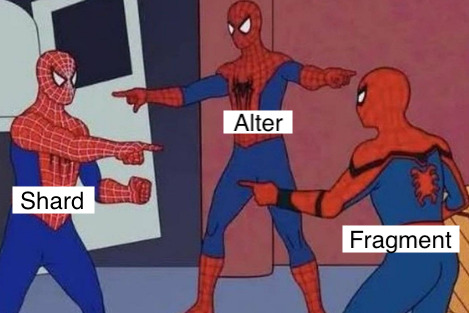
Like this. Right?
They all sounded so similar that we neither knew which is which at first glance..
And so, at the end of this post you will be confident in pointing out who is who, just like a spiderman who can tell apart from its own multiverse friends, that is. So let's get pointing to the smaller details!
How it works..
We know what it's like to be conscious, yeah? What if i were to tell you that yes, there are varying degrees of consciousness, and that we all can fluctuate on those levels too?
The levels of consciousness can vary from only being aware of its physical surroundings and react instinctually (lesser level), to being able to self-introspect and understand what they like and dislike (higher level). This is all dependent on many different factors and i want to clarify that it takes more than just 'awareness' to tell a fragment apart from an alter for example. But, still important to know what level its at.
This explains why shards, and fragments are less flexible when facing an issue, as they're more limited or not as equipped as an alter in terms of reasoning or level of logic/knowledge. So why is that? It can be from the intensity of dissociation, and other things like how much implicit and explicit memories it retains, this includes experiences.
How to tell them apart..
Sure, theres a spectrum to this too, as every type of part can be a bit different though still can categorized loosely, not meaning it has to fit perfectly to the box :
1. No sense of identity and, or tangible form/shape outside of performing a specific task, or hold a single memory/mood. (Shard)
2. Small sense of identity (a trait that is distinctive/distinguishable), possibly have a less blurry appearance than level 1 and still performs specific tasks, have little to no memories/range of emotions. (Shard)
3. Mish mash of small qualities, but not enough to encapsulate an identity/personality, may have a sense of existing, and can emotionally react to environment/situation. Usually have a defined innerworld form, and may retain some memories but depends on origin, still fixed on role. (Fragment)
4. Has a developed dominant facet, which can be seen more lively and autonomous compared from level 1-3,, but still a bit rigid and have a narrow/limited view in general. Can distinguish and identify feelings, and have goals/hobbies/interests, self curiosity/exploration to function outside role. (Fragment, leaning to alter)
5. Has a multifaceted personality in which it cannot defined by one word, fully knows its likes and dislikes, long term goals, morals, and a complex view on life. May have developed purpose outside role job, pursuing self-fulfillment. (Alter)
So in conclusion, shards are not wholly self aware and rely on current implicit memories, from my own system experience shards feels so blank, lifeless, somewhat robotic. Fragments have a partial sense of autonomy, it can rationalize and react to its own accord, reason, and learn/explore,, though had not fully know who they are. Alters are like any other usual people, where it has accumulated knowledge and experience that had shaped then throughout existing, reinforcing a faceted sense of self and purpose.
Growth to perfection..
Are you also wondering if shards and fragments can grow to an alter? The answer is, yes! Though some can be stuck in a certain stage, which is nothing to be ashamed about, and doesn't need changing.
Though, this takes a really long time and process, i note my own fragments will reach to a stage where it barely matches the loose category of an alter in 6 months, and to be a fully developed alter, it might need a whole year (okay this is my own calculations, other people will have it slower or faster).
To grow a shard towards a fragment category, my theory is that you have to interact with, and let them immerse/exprience the real world by supervision (outside of its role task) to develop more environmental, and self awareness. They will be very limited in terms of knowledge and names so this is a good time to start introducing these, and they may not even realize they exists themselves before sometimes,, try nudging them activities to experiment, and foods to taste, examine emotion wheel.. theres a lot to start from.
To grow a fragment to an alter, start introducing other views and complex topics, the goal here is to create a more developed understanding of life. From my experience, all my fragments have a dominant facet, e.g. angry dog vibes; and slowly let them learn how to be soft, or act more polite,, it will slowly solidify as a new facet, now capable of being kind and not always behaving threatening/i-will-still-bite-you attitude to every situation, as it now can be more flexible which facet it should use depending on situation.
Last words..
So, you are now an educated spiderman who can not only point out, but understand the basics of why,, and how to grow a part to have a better sense of awareness!
Let me know in the comments, i would like to hear why the part you had specifically picked/chose is possibly a shard/fragment/alter from your own reasoning and interactive mini discussion with me,, lets finally put them into real practice yeah?
Also, Happy Valentines, *offers you a free heart chocolate*
- j, your educational fiancée
#did#actually did#did community#did osdd#did system#dissociative identity disorder#sysblr#plural#system stuff#jeducates
378 notes
·
View notes
Note
Question about Brakul: where does he stand in Wardi class distinctions? He's a foreigner, but associated with a nobleman and has access to wealth and status symbols. Does he have something like a higher-class position or is he seen as more of an elevated lower-class person? Does any of this framework even make sense in a Wardi context? And how would he see himself?
Absolutely considered an elevated (if not more derisively ‘upjumped’) lower class citizen, but in kind of a complicated manner.
Sworn brotherhood establishes a legal blood kinship tie (blood of covenant, which is also what establishes kinship in marriages and adoptions). The legal implications are much less profound than marriage or adoption, it basically just establishes that each man involved has obligations to the other’s wife, children, and assets upon death.
The biggest difference from marriage or adoption wrt Class Implications is that in interclass marriages/adoptions a woman or child is functionally shifted into the class bracket of their new husband or adoptive father (women and children are both under the legal control of their husband or father (until adulthood in the case of boys and marriage in the case of girls), and thus absorbed into this man's household). This doesn't apply here, given both parties are adult men and both legal heads of their own households, thus class shifting in either direction doesn't have any basis whatsoever.
Sworn brotherhood ties also differ in that they are arrangements exclusively between two individuals, rather than two families. The parents of each party do not have obligations to their son’s blood brother (or vice versa, though this is more complex on a social level). Fathers also do not have to accept their new pseudo-son as kin- this has no legal dimensions, but has strong social dimensions. A family patriarch formally acknowledging the new brother as ‘son by blood’ effectively canonizes this status among all his dependents (wife, sons, unmarried daughters) and makes disputing this status to be an insult to the entire family name, rather than just to the two men involved.
Interclass brotherhoods are not unheard of and are actually far more common than interclass marriages (it lacks the same intensity of economic motivations as marriage). The lower class individual remains a commoner, they do not receive the legal benefits of hereditary nobility (full land ownership rights + ability to serve in high public office/many priesthoods + differentiated status for criminal charges + differentiated tax status + etc), but they are to be Socially acknowledged as kin by blood, out of respect for their status as blood kin to hereditary nobility or at least out of Not Wanting To Start Shit with their noble blood kin.
At the most basic level this is a linguistic and behavioral shift. If you're a commoner, you're pretty much going to HAVE to address them deferentially ('amna' ('sir') honorifics, high-esteem noun/verb forms, bowed greetings, etc), you DO NOT want to risk insult to the nobleman they're tied to. If you're nobility, you should address them with levels of linguistic respect you wouldn't otherwise commoners, just without using forms exclusive to actual nobility (ie you don't call them 'lord' but you should use 'sir' to be respectful and 'blood of the lord [nobility partner implicit]' if you're being really generous about it). You aren't completely Mandated to, but you will if you don't want to offend another family.
So like all this being said, the nuances of Brakul’s exact situation are:
'heathen' ethnoreligious minority
not Technically a peasant in that he did not tend land assets of a lord and was not born into this societal structure to begin with, but would be considered such on pretty much all other levels
current legal Imperial Wardi citizen
commoner class
sworn brother and thus legally and socially kin by blood of covenant to a nobleman
was never acknowledged as son by blood by said nobleman’s father
does not have a wife or children, when the central Point of this kinship arrangement is mutual security for each man's wife and children and their assets
has livestock assets under his name but no land
the hard material benefits and obligations of the sworn brotherhood arrangement are almost cartoonishly weighted in Brakul's favor
is straight up just living in his brother’s house
So like, Brakul's status is legally sound. But his status on social levels depends largely on how much any given person takes it seriously, and from there whether they consider 'insulting Haidamane Janeys and probably no one else from his family' to be socially risky.
His entire situation makes his reception weighted towards "EXTREMELY upjumped peasant", though how people treat him by extension varies. Most people he encounters pay him expected basic social respect for his kinship status, but whether these people respect him as a person, see him as an amusing curiosity, or have no respect whatsoever and just don't think it's worth starting shit varies. The most spiteful end of his perception is "EXTREMELY upjumped cattle raider peasant heathen via that soft Haidamane failson, is leeching off him and presumably kept around to be his top, AND he might have cucked him. Me being asked to pretend this is what sworn brotherhood is supposed to be is an insult".
As for Brakul, he has a pretty thorough understanding of how his position is perceived and how it functions legally, but his perception on what that means in practice is colored by his background. Elite status in the Chenahyeigi peoples can be Functionally hereditary to a clan but is more based upon maneuvering to accumulate and retain wealth and to keep other clans in your allegiance and/or debt. Upward mobility is theoretically possible for anyone, it's mostly a matter of making the right friends and binding allegiances (usually via marriage, but sworn brotherhood is also a thing here).
He understands that these same dynamics very much Aren't at play, but sees the day to day material realities of his station as functionally similar (just applied to a vastly different context). He DOES have direct access to wealth (and Some of it is his own at this point, he has livestock assets to his name alone) and most of its benefits. As a commoner citizen, he can't get a political office or join most priesthoods (whooooo cares) and has to pay proportionately steeper taxes than the noblemen (ok this one kind of sucks), but he's living in the same sort of profound economic/physical security and relative leisure that the Wardi nobility does, and in ways that matter to his own value system as well. He's attained a sort of lateral upward mobility in another society.
Other aspects of his current situation in life are more complicated but in terms of how he defines his station, he sees himself as, for all intents and purposes, being married into South Wardi nobility. The concept of the hereditary nobility in of itself means absolute jack shit to him (he doesn't even slightly conceive of these people as being special in any capacity beyond their situational power in this system), it's just another society that he's a part of by right of kinship.
He would self describe the totality of his current place in life as the son of [all 24 members of his male and female ancestral lines] of the Bict-Urbinnas West Rivers peoples, citizen of the province Wardin, blood to the lord Haidamane Janeys, blooded warrior and unit commander in the order Odotsomale, wealthy in cattle.
49 notes
·
View notes
Text
Let's address the "what about Ben being Bi or Pan?" question
This post is a way to explain why I called what happened in season 3 as heteronormative.
You are obviously allowed to read him as bi/pan coded. You can headcanon him as such. It's totally valid!!!!
The thing is, can you call what happened on season 3 as bi/pan representation? Really? Can you celebrate it as a expression of Ben's bisexuality/pansexuality?
I'm asking that bc at this moment, we don't have any canonical prove to classify him as bi or pan. And Ben hasn't a canon sexuality. So you get it's different seeing him as bi coded from seeing him as bi representation? While "queer coding" can refers to the subtext, I'm using the word "representation" to refers to the canon material.
So when I called what happened on season 3 as heteronormative I was referring to the representation, I was not doing it to exclude a possible bi/pan coding around Ben's character. I was using the canon events as base.
But what about the mentioned subtext? Can't we use it as a prove?
Look, I'm differentiating subtext from canon for a pretty important reason: interpretations of the subtext can diverge. If you think about it, it would be to easy for the audio-visual industry if for making a character from a piece of media canonically queer, they just had to do a implicit subtext. Bc this would mean they don't have to make anything explictly queer, and since not everyone would see queerness in the mentioned subtext, that media wouldn't necessarily be associated with the lgbtqia+ community ( this is a general example, I'm not referring to jwct).
And I need to be clear: I'm not saying I don't see value in subtext.I love seeing subtext in things! I'm just saying I don't use it as a official confirmation of queerness, since we never know if that said subtext were intended by the show/movie's writer.
So concluding, Ben is queer coded for me, but this queer coding doesn't match with the current heteronormative representation of his character, and that is exactly what I got disappointed at.
So let's make it clear
-> Yes I think Ben is queer coded
-> No I don't see what happened with him in season 3 as queer representation
-> Yes I recognize you can headcanon him as bi/pan or think he is bi/pan coded
-> No I don't think what happened is season 3 represents well a bi/pan person
-> Yes, I'm treating what happened as heteronormative
-> Yes bi/pan people can be in straight relationships. But as I mentioned before, I don't see what happened with Ben in season 3 as a portrait of a bi/pan person to begin with, we don't have proves of he being a bi/pan person in a relationship, just subtext
#idk if It's important to mention it or not? but I'm bisexual 👍#ben pincus#jwcc#jwct#ben pincus jwct#ben pincus jwcc#bengia#gia jwct#gia#jwct spoilers#jwct season 3 spoilers
25 notes
·
View notes
Text
When discussing the benefits but also the dangers of fantasy in TOH, it makes me consider how this ties into Belos’ bigotry, religious superiority, white supremacy, etc. Because I see how in the parallels to Luz and the depictions of his witch hunts as a ‘game’ he played as a kid, the show is getting into the thought process behind white supremacy and the like; Specifically, by suggesting that it comes from the same core principle of “I was born special, I’m a hero.”
Because think of it this way; I was born inherently better than others, it’s in my blood, I have to defeat evils? These aren’t unlike what white supremacists believe about themselves. After all, TOH is coming off of Harry Potter, which is criticized for the “It’s in his blood” trope with the protagonist.
This is foiled by Luz, who wants to believe at first that she’s special and things will automatically come to her because of it, but then Eda has to explain; Sorry kid, but if you want things you have to work for and earn them, just like anyone else. Some things can be attributed to luck on Luz’s part, but it’s not as if she’s blind to this and saying it’s ‘destiny’ (unlike someone else), plus in general we all have a bit of privilege in some ways.
And again, that ties back into Christian white supremacy, particularly the Puritans, who believed their colony would be a "City upon a Hill." That it’s their goal to enlighten people, or else root out the evildoers; You can see how this evolves into evangelicalism in the U.S. and the right’s obsession with anything new as satanic, even if it’s something like Elvis Presley or Pokemon (which Dana grew up with, coincidentally), or more recently, furries.
(No really, this actually happened I kid you not. It seems like an exaggeration but I swear it genuinely happened and it truly is absurd that it did.)
Anyhow I think that’s important, because it’s not just the message that Christian white supremacy is bad, it’s why people even believe and buy into these things to begin with. A lot of alt-right 4channers and the like fall into these rabbit holes because they feel cheated out of the implicit, unconscious promises of white supremacy and feel as if they’re owed something; So obviously women and PoC, the queers, the ‘diversity hires’ and affirmative action, this is what’s cheated them.
And you can see the connection between white christian ideas and how that can translate into a lot of fantasy stories, hence “It’s in your blood” and “It’s destiny,” as well as Isekai Colonialism; The idea that what if another world and its inhabitants just existed for you. These tropes are inspired by outdated ideas that Christian white supremacy, an outdated belief, has plenty examples of and sometimes even inspired.
And this is why it’s important to engage with these things critically and question them… But at the same time, Luz is still allowed to love Azura, it’s just about maintaining a critical eye and being self-aware of what you internalize and don’t. Hence her learning to differentiate reality from fiction and not become delusional; Hence King doing the same!
By making that connection, it does explain this type of bigotry by framing it in a way that viewers can actually relate to, even if they also condemn it just as much, if not moreso after understanding. It ties even the genocide with tropes like the dragon slayer, the endless horde of monsters you don’t ever have to feel bad about or question killing, or the DnD Evil Race; Which on their own, these stories aren’t necessarily in advocacy for genocide of course, some of them are just inspired by previous ones without making that connection. And most people know not to let it affect how they see reality.
Because it’s one thing to let yourself be petty and find catharsis against a genuine, extreme example who has gone out of their way to hurt you (those definitely exist, alas); But it’s another to actively search for people to feel angry towards, amidst groups unrelated to you, and provoke them until they give you that ‘justification’. Because you’re not responding to anything, you are the aggressor; In essence, you are performing a witch hunt, in a need to feel like a hero enacting righteous judgment.
Because you’re desperate for the power of putting someone else beneath you, which is what the mundane bully does, out of the belief this conversely translates into you being above others; Again, the ‘chosen one’ beliefs, the Christian white supremacy. And suddenly you better understand why Evangelicals raged over something as innocuous as the Pokemon games that Dana grew up with, back when they first came out.
So Luz understands; She does understand, better than some people, in fact. She understood the Collector. But just because she understands, doesn't necessarily mean Luz approves or excuses; She still has every right in condemning Belos because she never let herself go that far, and this behavior would be condemned even by those trying to make up for it; It’s why they try to make up for it. And the fiction Luz wants to happen for herself (which isn’t the same as the fictions one enjoys) isn't centered around there being hidden bad actors amongst the populace to constantly root out; Luz is only going to react, not act, and consistently, predominantly sees the best in others.
In the end, Belos latched onto Caleb marrying Evelyn, and then the Grimwalkers, and finally Luz, as a way of a proving a point to himself; That wiping out witches WAS in service of humanity, it would actually help them, by showing how he 'rescued' a human from temptation. I'm sure he genuinely loved Caleb, but in an extreme form of Luz's Wing it like Witches, at some point he subsumed Caleb's input and agency to instead make him into a docile trope to make decisions for.
And when Caleb didn't go along with that story, pointed out how it didn't fit the reality of the situation; Philip killed him! His priorities shifted from doing it for Caleb's sake, for the sake of HIS fantasy; He saw an opportunity to live out the Witch Hunter story and it mattered more to him than actually helping someone, or realizing in relief he didn't have to.
Hence the Titan saying Belos "fears what he can't control" due to "his need to be the hero in his own delusion." It’s a quote applicable to real life conservatives who look for things to outlaw, because hating makes them feel like righteous saviors; Remember Pokemon? Gotta save people from themselves and any potential temptations… Belos couldn't control Caleb, and the Grimwalkers? Belos' way of re-attempting his 'side quest' to again, prove that what he's doing is for the sake of humanity, in the absence of actual humans to work with.
Not that he cares about this for fear of hurting others, but because he fears it means he isn't the special hero. Note that Belos doesn't feel guilt over any witches and demons he killed in For the Future, it's telling; As is the assumption that even if he was treated with hostility when arriving in both Gravesfield and the isles, Belos still understood that murdering the colony was wrong… Yet ignores this lesson when it comes to demons because of hypocrisy, choosing to go after the world that was canonically accepting and would be much harder to attack.
And when Luz shows up, Belos abandons Hunter (showing how much he really cared) because Luz is a real human to save, even if she's technically a queer girl of color; But if you remember how Americans kidnapped Native children and assimilated them into Christian society and culture, it actually makes perfect sense because it's another form of genocide. And it's just as racist and insincere as the murder. And just like many homophobic Christians, Belos selectively chooses what to apply from the Bible because he knows it speaks contrary to what he does and he fears that, it’s something he can’t control despite his attempts to.
69 notes
·
View notes
Note
hiii I’m doing fuckin maths revision rn it’s kicking my ass BUT I managed to answer a question on implicit differentiation which I’m SO bad at and I didn’t know how to do it but now I do!! I’m gonna NAIL my exams!!
Anywayyy, what are you up to :3
I made a stuffed animal abomination

and I'm watching my siblings today! imma watch a shitty horror movie and bark commands at them :P
I got like seventies and low eighties on my exams lol but I'm a dummy I'm sure you'll do fantastic!!! :D
19 notes
·
View notes
Text
Alhaitham and Kaveh - not 'friends' but 'roommates'
(This is a reworked excerpt taken from my Haikaveh essay! If you're interested you can check it out here or as a pdf <3)
Due to Chinese game restrictions, explicit mentions of homosexuality or overt queer references have resulted in less implicit ways of conveying queer relationships or characters. Therefore, same-sex characters in romantic relationships are assigned the platonic status of “best friend” or “friends”.
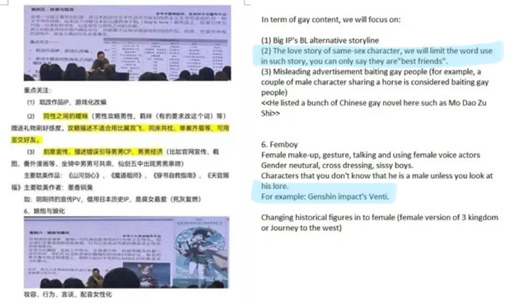
As such, these restrictions can be used as guidelines in establishing queercoding within Genshin Impact. It is of note, however, that this rule does not mean that all characters who are canonically “friends” are in a romantic same-sex relationship. Differentiating between same-sex couples and platonic friends (who have all been assigned the label ‘friends’) can be done by identifying particular care undertaken to ‘style’ characters. This is done so by queercoding, as in, using taboos linked to queerness; references which point to romantic connotation; or omitting certain details which casts obscurity on the nature of their ‘friendship’.
Alhaitham and Kaveh’s relationship has been styled in this way, as although various titles have been given to their relationship status, there has been no definitive term supplied overall. Alhaitham tells the Traveller that the two are “roommates”, with Kaveh confirming this, although stating that they “used to be friend(s), but not anymore”.
Within Kaveh’s Character Stories, their history as “best friends” is a painful one of separation, which can be seen as akin to a break-up, and despite their lack of status as ‘friends’, the two share an intimate knowledge of the other that no other character is privy too.

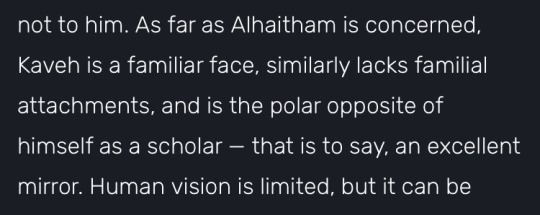
Condensing their relationship down to ‘roommates’ is an oversimplification that the narrative challenges the player to question.
This is achieved through their rapport with each other, seen within Alhaitham purposefully goading Kaveh, something which he cannot be seen to do persistently with any other character, as well as Kaveh’s unique reactions to Alhaitham, which present a side to him unlike which can be observed in his interactions with others. Additionally, the two mention the other without them present, as Alhaitham mentions Kaveh unprompted twice within the Archon Quest and once within his Story Quest, and Kaveh is prone to discussing Alhaitham with those who are aware of them living together, as Collei observes: “Seems like you always include him in the conversation, even when he isn’t here…”
When the two confirm themselves to be roommates, this is immediately followed by Paimon asking Kaveh if they are friends, to which Kaveh does not give a definitive answer too. When Paimon asks Alhaitham the same question in the Archon Quest, Alhaitham evades the question, and turns it back on Paimon, who notes that “[she] doesn’t know. That’s why [she’s] asking,” to which Alhaitham then describes Kaveh as his roommate. Although, this still is an evasion of Paimon’s initial question, Alhaitham neither denies nor confirms their friendship status. The status of their relationship is constantly called into question, for the characters they interact with, and for the player.
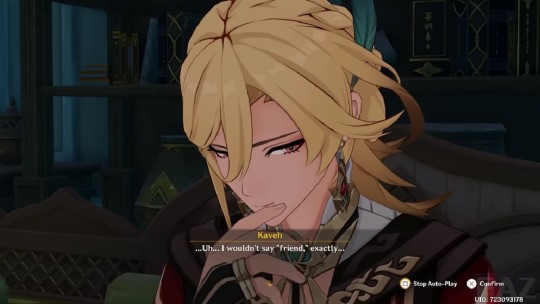
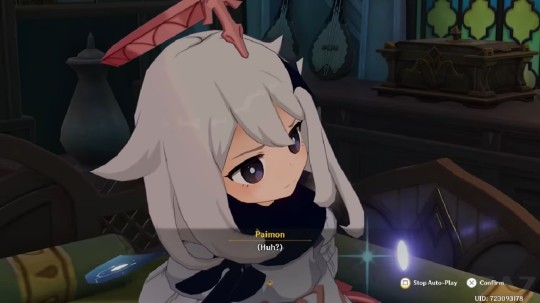

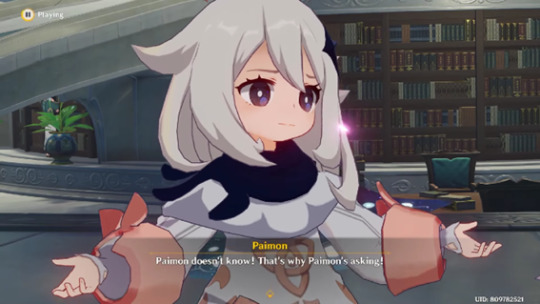
This casts an ambiguity over their relationship which aligns with Chinese gaming regulations in regard to same-sex couples, which in turn, points to a certain ‘styling’ of relationship which differs from general platonic friendships within the game. Where both platonic friendships and same-sex relationships can only be openly dubbed as ‘friendship’, signifiers must be present in order to differentiate these platonic friendships from the non-platonic.
Obscurity of relationship status can be used to do so – where characters are not explicitly “friends”, but are evidently tied to each other in some way, more than their assigned platonic status. Here, Kaveh and Alhaitham are irrevocably connected beyond their “roommate” status, and although they are not currently described as “friends”, they used to be, “best friends” according to Kaveh’s Character Stories, which creates a gap for interpretation.
The player is encouraged to interpret the reason for the two’s parting of ways, along with the reason for their current rapport. Although Kaveh asserts that there is a mutual “disdain” between the two, Kaveh observably talks about Alhaitham enough for Tighnari to assert: “No dinner with Kaveh is complete without a few words about Alhaitham." Rather than out of disdain, it can be surmised that Kaveh talks about Alhaitham due to the fact that he cares, as he states that the reason he has so many troubles regarding his work is because he cares so much about it.
When paralleled with his troubles with Alhaitham, being that Alhaitham finds a way to “infuriate” him every time they talk, it can be inferred that Kaveh’s approach to dealing with his work is the same as to how he deals with Alhaitham.
If Kaveh’s assertation that the “disdain” between the two of them was true, then there is no basis for him to talk about Alhaitham as much as he does. This is due to his attitude in caring about something results in him verbally expounding the problem, the same behaviour he exhibits when dealing with Alhaitham. By his own reasoning, if Kaveh did not care about Alhaitham, he would not be so “infuriate[d]” by his words.
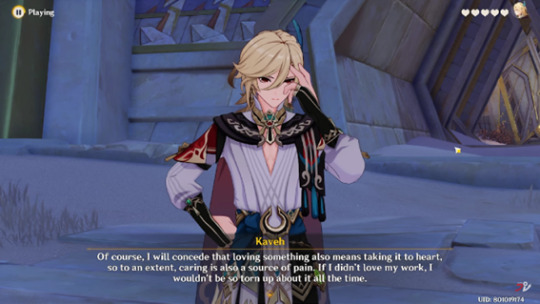
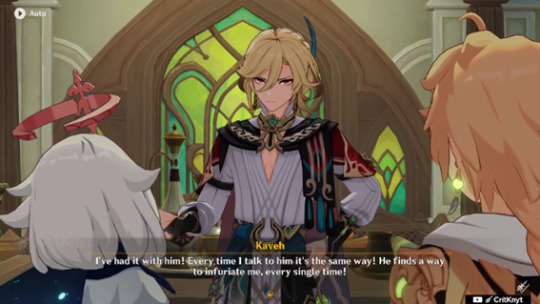
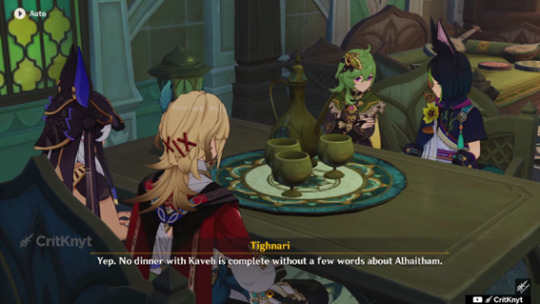
In turn, the player can see Alhaitham’s care of Kaveh manifest in his concern for Kaveh’s wellbeing within A Parade of Providence. In this sense, the rapport the two have currently which the narrative prompts the player to question can be explained. The two hold a mutual concern and care for the other, but due to elements in their past, they cannot address this, and thus it goes unspoken. The same can be said about the explicit status of their relationship, as no canon label applied to the two can truly explain their relationship, with ‘roommates’ being a clear oversimplification of their bond, and always followed up with the question of their friendship.
Alhaitham and Kaveh’s status as ‘friends’ is disrupted, not only due to the canon ending of their friendship in the past, but also in the current narrative of the game due to this refused label. Alhaitham and Kaveh do not adhere to the status of ‘friends’, either evading it (Alhaitham) or outright denying it (Kaveh), however, their bond remains central to each of their respective narratives, so much so that their differing viewpoints are integral to the other.
Alhaitham and Kaveh have been designed so that they are integral to each other, and the obscurity of their relationship acts as a signifier that their bond is not of a typical platonic friendship.
In Chinese gaming restrictions regulating platonic bonds and romantic bonds between same-sex characters as strictly ‘friendship’, Genshin Impact can be seen to subvert this in order to queercode. By creating an obscure bond between a same-sex relationship, a bond which the game constantly calls into question, a silence has been generated as to what the status of the relationship really is. The depth to Alhaitham and Kaveh’s relationship and the unspoken nature of it alludes to the queer taboo, in that its inability to be definitively labelled generates an otherness than that of an easily understood platonic bond.
#haikaveh#kavetham#alhaitham#kaveh#haikaveh meta#genshin meta#how have i just properly clocked that the library scene and kaveh saying the thing about caring are in the SAME hangout ending#i feel like im chewing on sawdust#i am wringing out every instance of heavy traces of homosexuality in the writing of these two#they make me crazy insane#they are deliberately avoiding labels#theyre not friends or roommates theyre a secret third thing#homosexual - but you didnt hear this from me!!#also im gonna be posting about a parade of providence at some point#because it owns my being#its one of my fav parts from the essay hehehe
105 notes
·
View notes